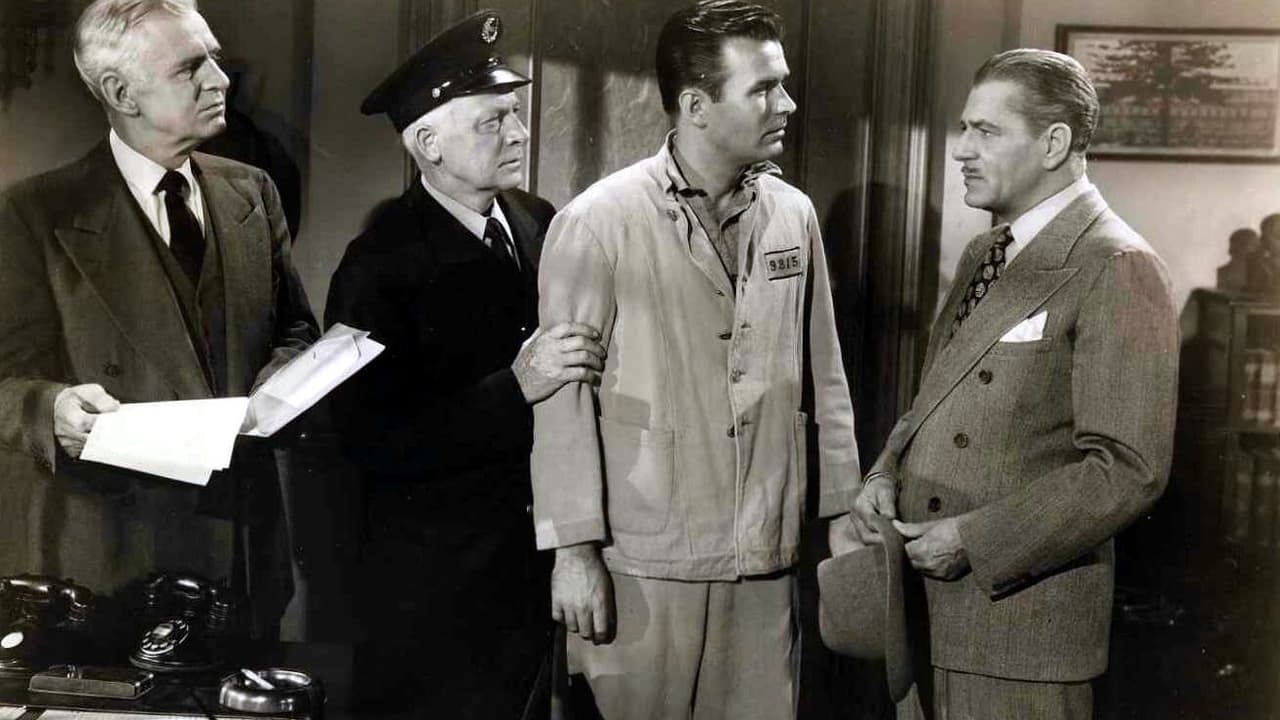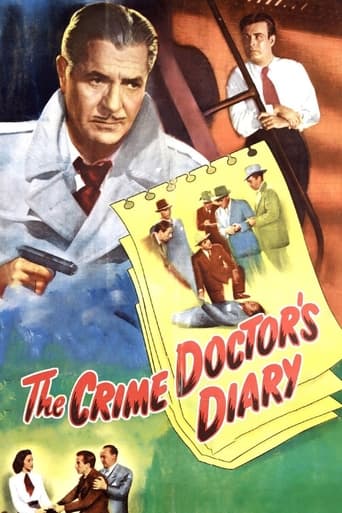Matrixston
Wow! Such a good movie.
Glucedee
It's hard to see any effort in the film. There's no comedy to speak of, no real drama and, worst of all.
Micah Lloyd
Excellent characters with emotional depth. My wife, daughter and granddaughter all enjoyed it...and me, too! Very good movie! You won't be disappointed.
Roy Hart
If you're interested in the topic at hand, you should just watch it and judge yourself because the reviews have gone very biased by people that didn't even watch it and just hate (or love) the creator. I liked it, it was well written, narrated, and directed and it was about a topic that interests me.
gerdeen-1
A good whodunit should have a bit of originality in the plot, and the solution should not be too easy to guess. And it shouldn't be too long. Under those criteria, this last episode in the "Crime Doctor" series holds up very well.The plot is about a convicted arsonist who gets an early release from prison. The agent of his good fortune is the Crime Doctor himself, who believes the man is guilty but considers him redeemable. Ignoring the advice of the doctor and others, the man rashly sets out to prove his innocence. Soon he's in bigger trouble than ever, and it all looks just a bit too convenient.Warner Baxter, whose career was drawing toward an end, is considerably grayer than in his previous "Crime Doctor" films, and he doesn't get involved in much action. But he doesn't seem frail. He has a stylish presence that compensates for the movie's fairly spartan production values.The two women in the ex-con's life, who turn out to be important to the mystery, are played by Lois Maxwell and Adele Jergens. Maxwell is better remembered today, because of her later role as "Moneypenny" in the James Bond films. But in 1949, Jergens, a former burlesque queen, was a much bigger name in movies. She certainly gets the more glamorous treatment here.
Robert J. Maxwell
An inexpensive and unpretentious murder mystery. Steven Dunn has just done three years on an arson charge for which he claims he was not responsible. He's sullen and resentful. But at least he appears to have the support of pert Lois Maxwell, who fawns over him. He may or may not have gotten over his pre-slam fling with sultry Adele Jurgens. He has another friend too, Warner Baxter as The Crime Doctor. As far as I could tell, the Crime Doctor keeps no diary in this movie. If he is, he's keeping it a secret. I thought over the conundrum in this title for a while and concluded that there was in fact a diary, only it wasn't a diary BY the Crime Doctor but rather ABOUT the Crime Doctor. It was being kept by one of the other characters, although it's impossible to tell which one because the word "diary" never appears in the movie. A dead body turns up, one of the men responsible for Dunn's sentence. Dunn is naturally Suspect Number One but there are a number of other likely suspects. Among the juicier is Whit Bissel, whom you will recognize. He's a loopy employee who thinks he's a composer. Want to see some of his lyrics?In the little town where I was born There's a little brass French horn I used to toot when I was just a boy, Toot toot. Toot toot. Toot toot.Well, I told you he was a little unbalanced. Whit Bissel never played such a colorful character again. He was continually cast as a timid clerk or something. But if Bissel's character is unusual, the Big Reveal is nothing less than astonishing. You'll never guess who the heavy is. Not even the Crime Doctor has a hint. He's confined to standing around and commenting on what he observes, with everyone's best interests at heart. You'd never know he was a doctor because he never practices any medicine, nor is his profession in any way underlined. They could as easily have called the movie "The Crime Reporter's Diary."The movie stands as a mild divertimento with some amusing moments. Toot toot.
markjeff_1
As has earlier been commented, Whit Bissell's performance here as an aspiring and mentally challenged composer is a scene-stealer. He intuitively takes the film to another plane with a blissful unawareness that is inadvertent and yet elevating. Along with the tragic end of his character Tom Lister in "Brute Force" this is one of his most affecting performances of the forties. Probably the second most affecting. He seems to inhabit this role as opposed to the other actors in the film who seem to just be going through their paces robotically and quite superficially with little or no special touch of humanity other than to move the story along so they can pick up their check. The film stops when he comes on the screen and you do a double take because you sense this performance is a silk purse in a sow's ear of a film. His character Pete Bellem, touching, halting and muddling along, stays with you when everyone else in the film just fades away into cardboard kitsch heaven. And that song of his so conscientiously crumbles upon itself that it takes on a profound, sad and yet sweet resonance which belies its silliness. Whit was a talented pianist, by the way. He puts that to use here (and in some other roles through the years). He was also a fencing enthusiast in real life. His character Pete Bellem, harmless and hampered and even harassed here by those who have no time of day for him and, in their self-anointed intellectual superiority, belittle what they feel are his mental limits, may be in a world of his own but in this world of charlatans and floozies and hucksters, his seems a better, kinder world. His fingers are his intellect. He loves his ditty no end and to the exclusion of all critique. He is a man-child in this not so promised land and (toot-toot) one you root for. He is the heart and very much the only soul of this film and definitely the only one who stays with you as the credits roll. Great job. Rest in peace, Whit.
Jim Tritten
Last of ten in the series with Warner Baxter playing the part of Dr. Robert Ordway, former criminal turned psychiatrist. The series ran from 1943-1949 and always involved the outsider specialist trusting and then helping hapless victims of the criminal justice system.This entry opens with Dr. Ordway talking about the impending parole of inmate 9815, Stephen Carter (Stephen Dunne), after serving three years for a crime of arson that he did not commit. The plot thickens when the accused is implicated in the murder of the man who took his job when in prison. The solution should not be a surprise.Lois Maxwell is not nearly as good looking or glib as she will become years later as Miss Moneypenny in seventeen James Bond movies. She plays the same role as a gate keeper for the head of the firm.Prolific character actor Whit Bissell plays Pete Bellem who records and keeps playing a song that seems to be central to the strange comings and goings on at the Bellem Music Company…"In the house where I was born" …"When I was just a boy. A recording of Pete's song becomes a critical part of the plot.Robert Armstrong looks a bit tired as gangster George 'Goldie' Harrigan. His new girlfriend Inez Gray, played by Adele Jergens, is best featured in a revealing negligee.Interesting introduction to the new technology of piping recorded music over phone lines to paying customers rather than having them order selected records at a juke box.The police are incredibly poor shots until the end. The writing is above average in this entry with such lines as, following an incomplete response to the police asking an alternate way out of an apartment building, "Did they ask if it was open?" Recommended.

